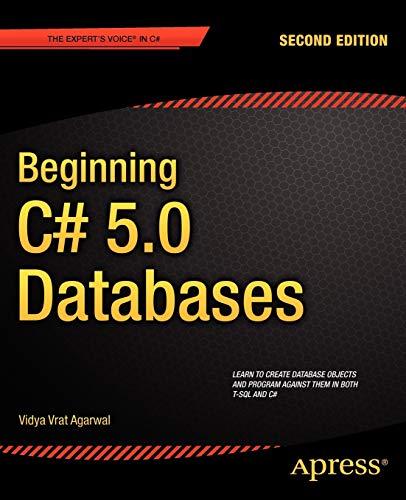Question
1. Consider the following hashing situation: The hash table is 1000 entries long. The search keys are integers between 0 and 9999. The hash function
1. Consider the following hashing situation: The hash table is 1000 entries long. The search keys are integers between 0 and 9999. The hash function is [h(key)=(keyrandom)%tablesize]
where random is a sophisticated (and efficient) random-number generator that returns a real value between 0 and 1.
Which is true of the hashing function (select all that apply)?
| fast to compute |
| utilizes a wide range of values between 0 and the size of the table |
| minimizes collisions |
| is repeatable |
2.Consider the following hashing situation:
The hash table is 10,007 entries long. The search keys are integers between 0 and 9999. The hash function is given by
const int TABLESIZE = 10007;
int Hash(int X)
{
for (int I = 1; I
X=X * X; // assume least significant digits are retained on overflow
return X % TABLESIZE;
}
Which is true of the hashing function (select all that apply)?
| minimizes collisions |
| utilizes a wide range of values between 0 and the size of the table |
| fast to compute |
| is repeatable |
3.
Consider the following hashing situation:
The hash table is 20,007 entries long. The search keys are strings less than 10 characters in length.
int TABLESIZE =20007;
int Hash(String s )
{
tot = 0;
for (int i = 1; i
tot += s[i];
return tot % TABLESIZE;
}
Which is true of the hashing function (select all that apply)?
| minimizes collisions |
| is repeatable |
| fast to compute |
| utilizes a wide range of values between 0 and the size of the table |
4.

Step by Step Solution
There are 3 Steps involved in it
Step: 1

Get Instant Access to Expert-Tailored Solutions
See step-by-step solutions with expert insights and AI powered tools for academic success
Step: 2

Step: 3

Ace Your Homework with AI
Get the answers you need in no time with our AI-driven, step-by-step assistance
Get Started


